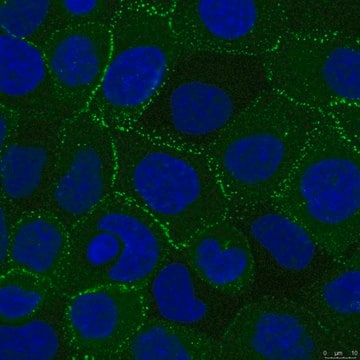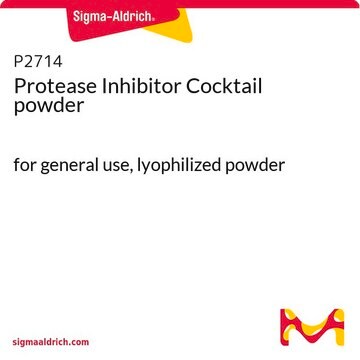R8761
Nco I from Nocardia corallina
Restriction Enzyme
Anmeldenzur Ansicht organisationsspezifischer und vertraglich vereinbarter Preise
Alle Fotos(1)
About This Item
Empfohlene Produkte
Qualität
for molecular biology
Form
buffered aqueous glycerol solution
Konzentration
10,000 units/mL
Versandbedingung
wet ice
Lagertemp.
−20°C
Suchen Sie nach ähnlichen Produkten? Aufrufen Leitfaden zum Produktvergleich
Spezifität
Recognition sequence: 5′-C/CATGG-3′
Cutting results: a 2-10-fold Nco I overdigestion of 1 μg λ DNA substrate results in 100% cutting
Heat inactivation: Inactivated at 65 °C for 15 minutes.
Cutting results: a 2-10-fold Nco I overdigestion of 1 μg λ DNA substrate results in 100% cutting
Heat inactivation: Inactivated at 65 °C for 15 minutes.
Anwendung
NcoI is a DNA restriction endonuclease that is used in molecular biology applications to cleave the DNA recognition site 5′-C/CATGG-3′, resulting in DNA fragments with 5′-cohesive termini.
Sonstige Hinweise
Supplied with 10x Restriction Enzyme Buffer SH (B3657).
Physikalische Form
Solution in 20 mM Tris-HCl, pH 8.0 , 0.1 mM EDTA, 100 mM NaCl, 10 mM 2-mercaptoethanol, 50% glycerol (v/v), 0.2%Triton X-100 (v/v) at 4 °C
Ähnliches Produkt
Lagerklassenschlüssel
12 - Non Combustible Liquids
WGK
WGK 2
Flammpunkt (°F)
Not applicable
Flammpunkt (°C)
Not applicable
Analysenzertifikate (COA)
Suchen Sie nach Analysenzertifikate (COA), indem Sie die Lot-/Chargennummer des Produkts eingeben. Lot- und Chargennummern sind auf dem Produktetikett hinter den Wörtern ‘Lot’ oder ‘Batch’ (Lot oder Charge) zu finden.
Besitzen Sie dieses Produkt bereits?
In der Dokumentenbibliothek finden Sie die Dokumentation zu den Produkten, die Sie kürzlich erworben haben.
Jonathan V Reddy et al.
Molecular biology of the cell, 17(10), 4353-4363 (2006-08-04)
Mannose 6-phosphate receptors (MPRs) deliver newly synthesized lysosomal enzymes to endosomes and then recycle to the Golgi. MPR recycling requires Rab9 GTPase; Rab9 recruits the cytosolic adaptor TIP47 and enhances its ability to bind to MPR cytoplasmic domains during transport
E M Van Cott et al.
Gene, 74(1), 55-59 (1988-12-25)
Methyltransferase genes from the FnuDI, NaeI, NcoI, and XbaI restriction-modification systems have been isolated in Escherichia coli by 'shot-gun' cloning bacterial DNA fragments into plasmid vectors and selecting for protectively modified molecules that resist digestion by the corresponding restriction endonuclease.
Retargeting of human T cells to tumor-associated MUC1: the evolution of a chimeric antigen receptor.
Scott Wilkie et al.
Journal of immunology (Baltimore, Md. : 1950), 180(7), 4901-4909 (2008-03-21)
MUC1 is a highly attractive immunotherapeutic target owing to increased expression, altered glycosylation, and loss of polarity in >80% of human cancers. To exploit this, we have constructed a panel of chimeric Ag receptors (CAR) that bind selectively to tumor-associated
C Kessler et al.
Gene, 92(1-2), 1-248 (1990-08-16)
The properties and sources of all known class-I, class-II and class-III restriction endonucleases (ENases) and DNA modification methyltransferases (MTases) are listed and newly subclassified according to their sequence specificity. In addition, the enzymes are distinguished in a novel manner according
Nico Mitro et al.
Methods in molecular biology (Clifton, N.J.), 952, 137-144 (2012-10-27)
The role of certain amino acids in the interactions of ligands with their cognate nuclear receptors is usually achieved by the resolution of the crystal structure of the receptor complexed with the ligand. As a complementary functional approach, site-directed mutagenesis
Unser Team von Wissenschaftlern verfügt über Erfahrung in allen Forschungsbereichen einschließlich Life Science, Materialwissenschaften, chemischer Synthese, Chromatographie, Analytik und vielen mehr..
Setzen Sie sich mit dem technischen Dienst in Verbindung.





